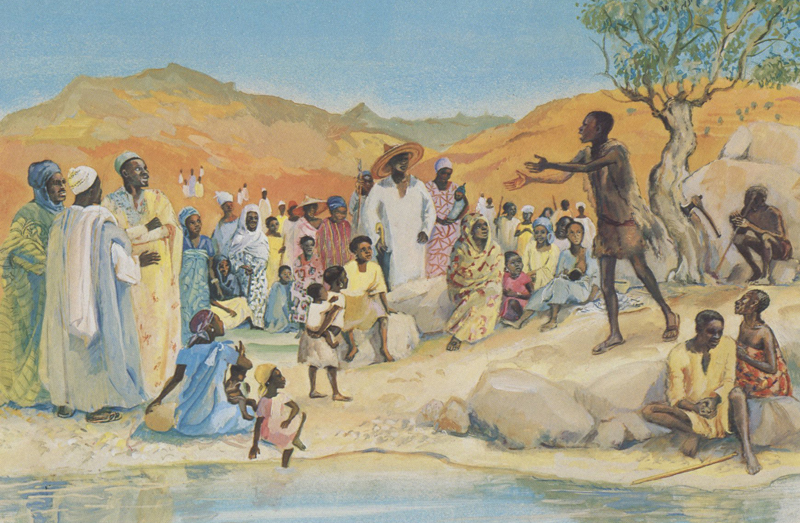
John the Baptist preaching in the desert
JESUS MAFA, 1973
My dear friends,
The passage from Mark 1:1-8, celebrated on the second Sunday of Advent, offers a profound reflection on spiritual preparation and humility. This period, marked by anticipation and preparation for the coming of Jesus Christ, aligns with deep spiritual themes present in both Christian and Buddhist traditions.
of Jesus Christ, the Son of God.
As it is written in the prophet Isaiah,
"See, I am sending my messenger ahead of you,
who will prepare your way;
the voice of one
crying out in the wilderness:
'Prepare the way of the Lord,
make his paths straight,'"...
- Mark 1:1-3
These verses emphasize the need for preparation. This call for readiness is not just a physical act but a mental and spiritual one. In Buddhism, the concept of mindfulness (Sati) is a form of mental preparation, reminding us to be fully present and aware in each moment. The act of preparing for Christ's arrival can be seen as an invitation to cultivate a mindful awareness of our spiritual journey.
proclaiming a baptism of repentance for the forgiveness of sins.
- Mark 1:4
John the Baptist's message resonates with the Buddhist understanding of self-reflection and acknowledgment of one's faults. Repentance, in the Christian context, is about turning away from sin and towards God. Similarly, in Buddhism, there is an emphasis on acknowledging one's misdeeds, understanding their consequences (Karma), and resolving to avoid such actions in the future. This process leads to purification and spiritual growth.
Now John was clothed with camel's hair, with a leather belt around his waist,
and he ate locusts and wild honey.
He proclaimed, "The one who is more powerful than I is coming after me;
I am not worthy to stoop down and untie the thong of his sandals."
- Mark 1:5-7
John's declaration is a powerful lesson in humility. This parallels the Buddhist ideal of humility and selflessness. In both traditions, recognizing the limitations of the ego and submitting to a higher spiritual reality are key steps towards enlightenment or salvation. John's role as a forerunner to Christ symbolizes the need to diminish one's ego to allow the divine presence to manifest.
- Mark 1:8
The distinction between John's baptism with water and the baptism with the Holy Spirit by Jesus highlights the transformative power of spiritual practices. In Christianity, the Holy Spirit is seen as a source of guidance, strength, and transformation. Similarly, in Buddhism, practices such as meditation and mindfulness are tools for transforming the mind, leading to greater wisdom and compassion.
Mark 1:1-8 invites us to prepare our hearts and minds for spiritual growth, engage in self-reflection and repentance, practice humility and selflessness, and open ourselves to the transformative power of the Spirit. These lessons, deeply rooted in Christian teachings, also find resonance in Buddhist practices, underscoring the shared journey towards spiritual awakening and enlightenment.